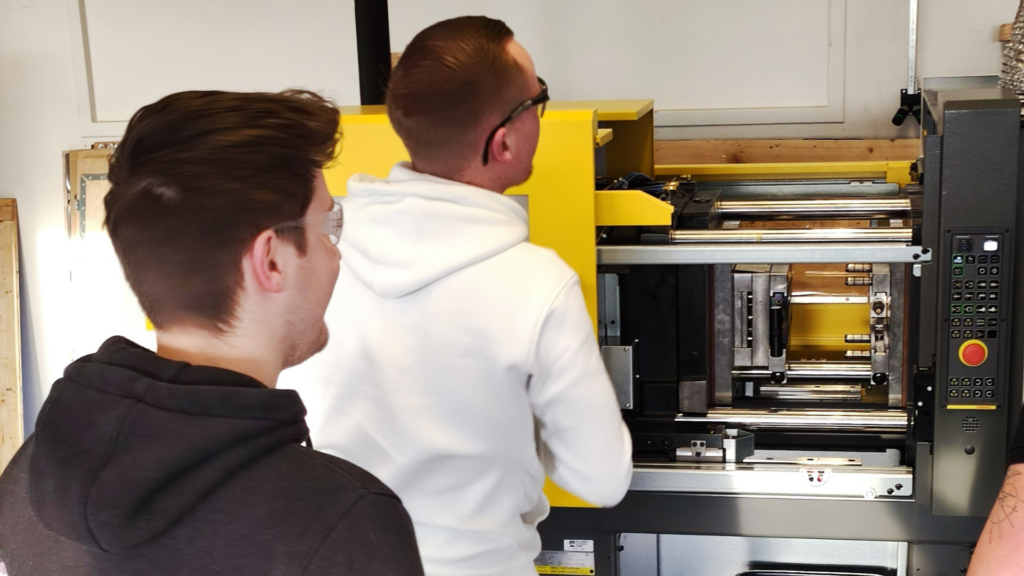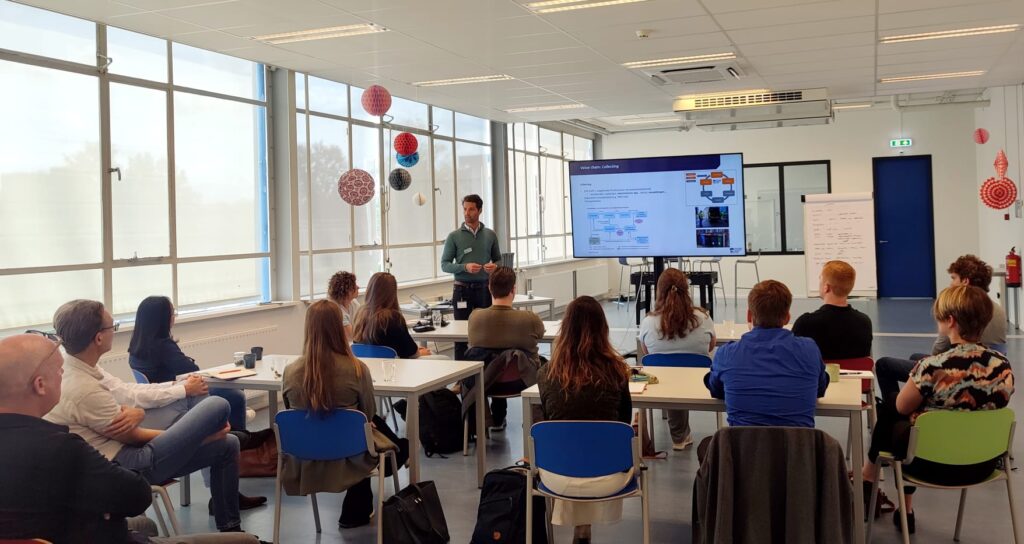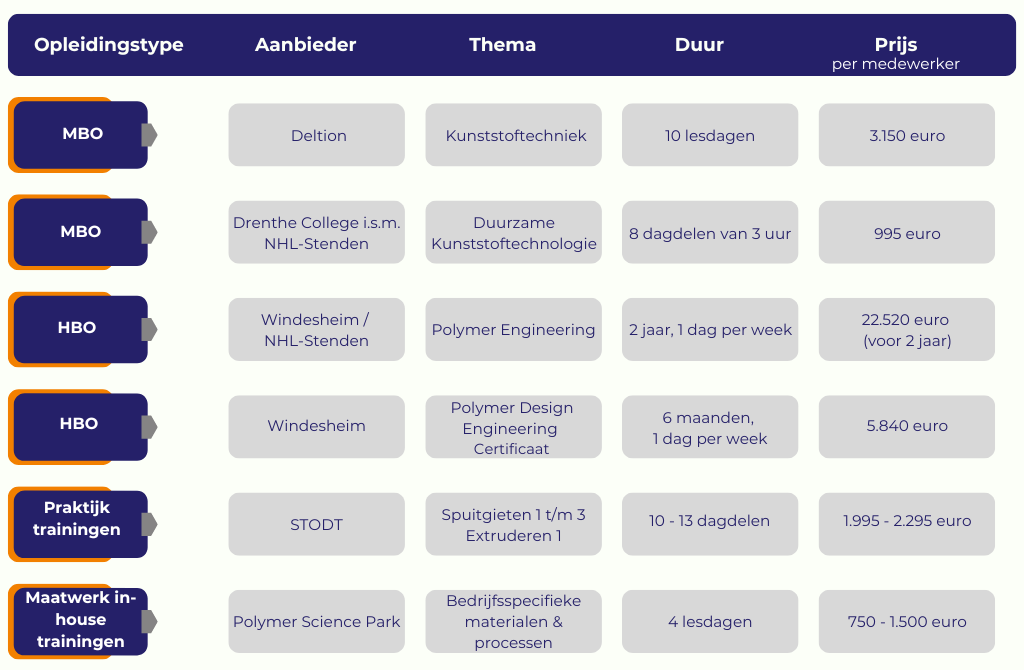Want to enhance the expertise of your staff? Here are types of training in the plastics industry.
Operators know exactly which buttons to press. They perform that ‘trick’ daily, of course. But what happens when problems arise? Do they also know exactly what is happening on the back end? And how do they adequately resolve this to prevent production downtime?
Showing involvement and taking responsibility for the production process are important reasons why companies in the plastics industry invest in training and further developing their staff. They want their personnel to feel responsible for ‘their’ process and to be able to resolve minor disruptions themselves.
In this blog, you will discover the types of training available in the plastics industry and the advantages and disadvantages of each. At the end, you will find four key questions to help you make an informed choice.

The four types of training and courses in the plastics industry
The landscape for training, courses, and workshops on (working with) plastics is vast. What should a company in the plastics sector choose? To assist you, we have outlined the four different training options available. You can also view them in the table further down in this blog.
-
Higher Education Courses
In the Netherlands, there are several higher education institutions offering programmes for the plastics industry at both bachelor and master’s levels, such as Polymer Engineering or Polymer Design Engineering. These programmes are often two years long (consisting of multiple modules).
- Employees delve deeply into the subject and receive a recognized higher education diploma upon successful completion.
- Please note that this type of training requires a significant investment, both in time (two years, one day a week) and money (an average of €11,250 per year).
-
Vocational Education Courses
In contrast to higher education courses, the vocational education (part-time) courses focused on plastics often last only a few class days. For example, employees can complete the Plastics Technology course at Deltion College in just 10 class days (20 sessions over 10 weeks).
- These are relatively short courses, culminating in an (level 4) vocational certificate.
- These programmes are broad and provide a solid foundation. Like the higher education courses, these programmes do not take place on-site.
-
Practical Training
Practical training, for example from a provider like STODT, focuses on a specific aspect of the plastic production process. Consider, for instance, injection moulding 1, 2 or 3, or extrusion 1. These courses are concluded with a nationally recognised industry diploma (VAPRO) if sufficient results are achieved.
- Good foundational training specifically on processing techniques that serve as a starting point for further development.
- The courses are often broad and (theory) not entirely tailored to the client’s materials, machines, and processes.
-
Custom Plastic Training (On-site)
For this type of training, a half-day intake is often conducted prior to the training to map out the needs and knowledge level of the group. This allows for specific focus during the training on certain materials (such as PVC, PET, PA, regrinds, and recyclate), processing techniques (such as injection moulding, extrusion, and blow extrusion), and operations, while avoiding ‘unnecessary topics’. The training is delivered at the production site by a subject-matter expert, in collaboration with your own specialists. Participants will also work on your own machines and with your own materials. Custom training can be organized for various departments; operations, research & development, as well as non-technical departments (such as sales).
- This is a short-term training that takes place at your own location, using your own materials and machines. As a result, the knowledge gained can often be applied immediately.
- Employees acquire the necessary vocational knowledge but do not receive a certificate or diploma.

Making a choice? Ask yourself these 4 key questions
Based on the types of training mentioned above, here are the four key questions you can ask yourself to make an informed choice for your staff.
- Is it important for employees to receive a recognised diploma or certificate?
In higher professional education (HBO), secondary vocational education (MBO), and practical training, employees receive a recognised diploma, (partial) certificate, or VAPRO certificate upon successful completion. This is not the case for customised training.
- Is it important that the training is conducted on-site and that the employee’s own machines and materials are used?
Training at the employee’s own workplace has significant advantages for the learning effect. He or she becomes familiar with all the ins and outs of their own machines and the materials they use daily. Do you consider this important? If so, a practical training session on-site or a customised training programme may be of interest to you.
- Do the employees already have basic knowledge (for example, injection moulding 1) and are they specifically looking for further depth?
Depending on the knowledge level of your employees, you can then opt for follow-up training with a practical trainer, such as injection moulding 2 or 3. This is a fixed programme that can cover topics that employees are already proficient in. The alternative is a bespoke training (on-site). These training sessions can be tailored to the knowledge level of the employees (from beginner to expert) and are specifically aligned with their learning needs. Unlike follow-up training with a practical trainer, employees in a bespoke training do not follow complete modules. They focus in a bespoke training on the topics they encounter or wish to learn more about.
- What training budget is available?
There are significant differences in price and duration among the various types of training. To give you an idea of these differences, we have compiled a selection of training prices and durations as of 26-04-2024 and presented them in the table below (in Dutch).

From Trick to Craftsmanship
One thing is certain: no matter which training, education, or course on plastics you choose, you are providing your staff with the necessary tools to make the transition from performing a trick to true craftsmanship.
Are you looking for a plastics training course for your staff? We would be happy to advise you on a plastics training course that suits your needs and those of your staff. Please feel free to contact Peter van Barneveld, Business Manager Training.

 Request quotation
Request quotation  Login
Login 
